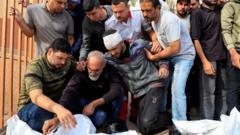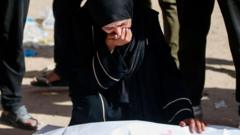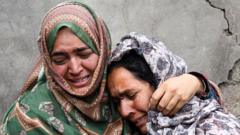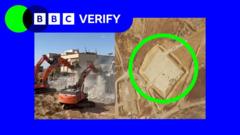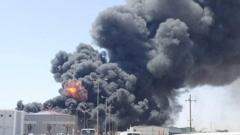As the humanitarian crisis in Gaza deepens, families struggle to find basic necessities, highlighting the dire conditions under the ongoing blockade.
Desperate Times in Gaza: Families Hunger Amidst Ongoing Blockade
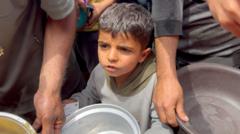
Desperate Times in Gaza: Families Hunger Amidst Ongoing Blockade
Amidst escalating tensions, Gazans face severe food shortages as humanitarian aid remains blocked.
In the midst of a crisis that has left countless families in Gaza struggling for survival, the harrowing words of a father and a six-year-old child shed light on the dire situation. “My children go to sleep hungry,” Ismail Abu Odeh's father lamented, as the child's yearning for food echoed the desperation felt across northern Gaza.
The BBC recently reported from Gaza City, where ongoing military actions have intensified the over ten-week blockade, resulting in severe shortages of food, water, and medical supplies. The local population, already overwhelmed by escalating violence, now faces starvation as aid distribution points struggle to meet the increasing demand for basic necessities.
Ismail’s experience illustrates a grim reality; after acquiring a bowl of lentils, his hope quickly turned into despair when he was left crying after it was knocked from his hands. The following day, the evacuation camp where he resides experienced a complete lack of food or water deliveries, amplifying the suffering of families already worn thin by conflict.
While the Israeli government claims there is no food scarcity and attributes issues to alleged looting by Hamas, the testimonies from Gazans suggest otherwise. Access for international journalists remains limited, complicating the gathering of accurate information, with communication primarily facilitated through local sources.
Residents are forced to be resourceful, redefining meals in ways they never imagined. Adham al-Batrawi, now displaced, recounted his efforts to create food from whatever meager supplies he could find. “We’ve invented ways to cook and eat that we never imagined we’d need,” he shared over WhatsApp, while struggling to meet the nutritional needs of his family.
Nurse Rewaa Mohsen, living in central Gaza, highlighted the emotional toll of surviving amidst constant bombardment. As she attempts to care for her two young daughters, the sounds of war have become an ominous backdrop to their reality. “Thank God that I am still alive with my girls,” she expressed, demonstrating the profound fear intertwined with the instinct to protect her children.
As Gaza's medical facilities come under strain, healthcare workers face their own anxieties concerning safety and the diminishing availability of medical supplies. Following a recent strike on the European Hospital, nurse Randa Saied conveyed the sense of terror felt by staff and patients alike, asserting the necessity of their duty despite the perilous conditions.
While the U.S. considers a new approach to delivering humanitarian aid, the plan has drawn criticism from the United Nations, which argues it may further politicize relief efforts. As conditions in Gaza deteriorate, families like Ismail’s continue to wait for the basic provisions they need to survive, illustrating the tragic consequences of a prolonged blockade and conflict.



